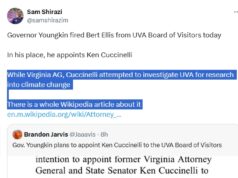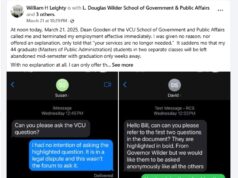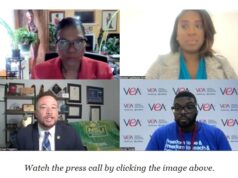From The Commonwealth Institute:
Virginia Can Choose Equity for Schools During Crisis
New report shows how last recession hit students in low income families and students of color hardest and how current budget response will do the same
RICHMOND, VA — There are well-documented consequences from school funding cuts that occurred in the aftermath of the Great Recession. The nationwide decline in per-pupil spending coincided with the first national average test score decline in the past 50 years and slowed growth in first-time college entrants. The impacts were larger in terms of funding declines and decreased test scores for children in neighborhoods with higher poverty rates, and widened disparities in test scores between Black and white students.
The funding inequity was worse in Virginia where state funding dropped by almost 3 times more per student in the highest-poverty divisions than in the lowest over that same time period. A new report from The Commonwealth Institute for Fiscal Analysis details the disproportionate impact of budget cuts following the last recession and how recent budgetary action taken by state lawmakers starts Virginia down the same troubling path.
Gov. Northam proposed and state lawmakers acted to temporarily suspend $490 million in early education and K-12 funding. The suspended funds for school divisions with the highest child poverty rates are twice as large per student as they are for the lowest-poverty school divisions, and there are also larger impacts for school divisions with the greatest share of students of color.
“These reductions mirror the mistakes of the past recession,” said Chris Duncombe, Policy Director at The Commonwealth Institute and co-author of the report. “This initial approach may have been taken for simplicity, given the uncertainty and challenges the state faces due to the COVID-19 pandemic, yet it does not have to be the final decision.”
Restoring the suspended funds would require action by the General Assembly. State lawmakers will likely take action on the state budget later this year in a special session when they have a clearer picture of state revenues. Yet, early reports already indicate large declines in state revenues that could further threaten K-12 funding. To avoid this outcome, the report identifies three strategies: seek additional federal aid; raise state revenues; and ensure racial, ethnic, and socioeconomic equity in school funding choices.
“Virginia can choose equity during this crisis and avoid repeating the lingering mistakes made in response to the Great Recession,” says Chad Stewart, Education Policy and Development Manager at the Institute and co-author of the report. “There is a better path forward for supporting our students and advancing educational opportunity even in challenging times.”
The Commonwealth Institute is hosting a webinar tomorrow, June 9, at 1 p.m. to speak further on the impacts as well as recommendations to protect K-12 funding. There is still time to register at: bit.ly/VaK12FundingEquity
The full report, Virginia Can Choose Equity for Schools During Economic Crisis, is available at www.thecommonwealthinstitute.org.
####
About The Commonwealth Institute
The Commonwealth Institute for Fiscal Analysis provides credible, independent, and accessible information and analyses of fiscal and economic issues with particular attention to the impacts on low- and moderate-income persons. Our products inform fiscal and budget policy debates and contribute to sound decisions that improve the well-being of individuals, communities and Virginia as a whole. Visit www.thecommonwealthinstitute.org for more information.



 Sign up for the Blue Virginia weekly newsletter
Sign up for the Blue Virginia weekly newsletter








